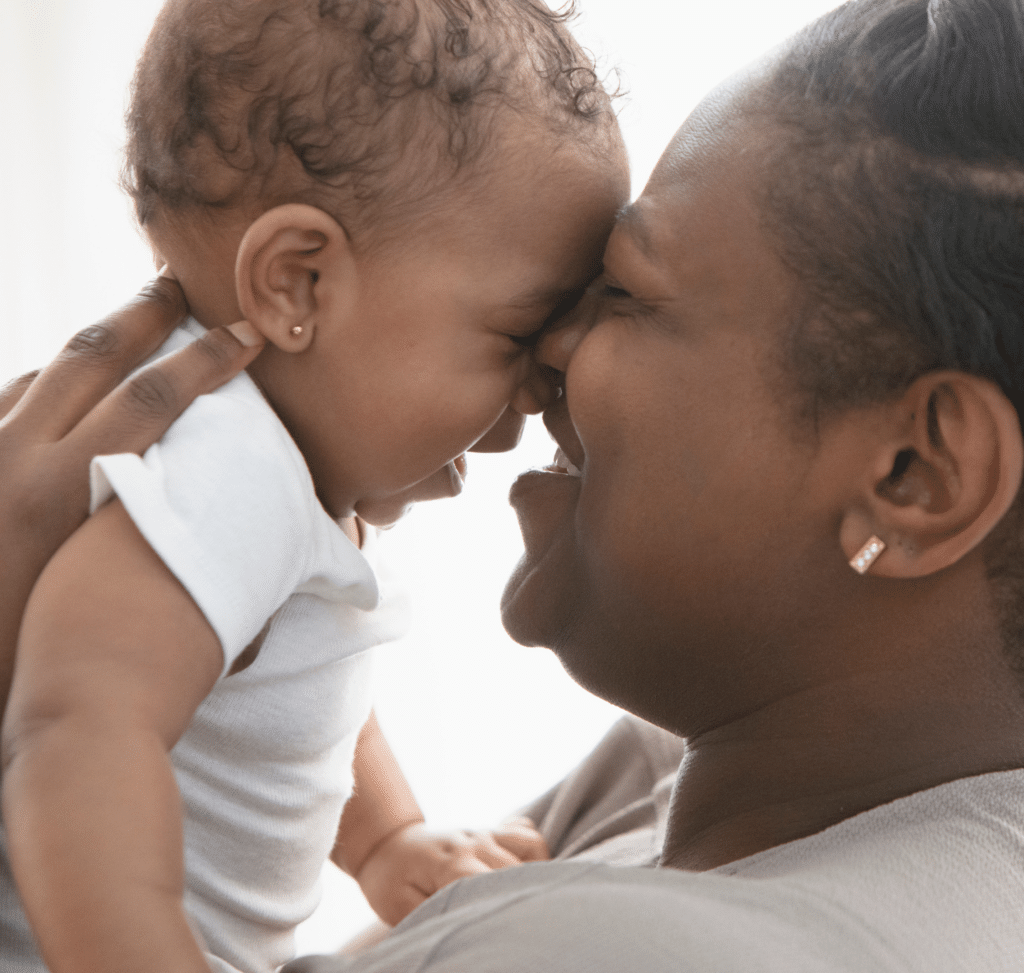Perinatal OCD: When Intrusive Thoughts Become Distressing

Picture this. You’re about to, or have just, welcomed a new baby into the world. You’re excited, but right now, you can barely feel anything but nerves. You keep getting these scary, unwanted thoughts and fears pop into your mind about harm coming to your baby, and you can’t seem to stop them.
Here’s the truth: Many new and expectant mothers experience terrifying and unwanted thoughts and fears. While it can feel ashamed of or like you’re the only one who has these thoughts, it’s important to know that these thoughts could be a sign of perinatal OCD.
Perinatal OCD is a treatable condition that isn’t talked about enough, despite so many women struggling with it. It’s a condition that leaves you with distressing thoughts and compulsive behaviors, usually centered around a fear of harming your baby or failing as a parent.
Before talking about this condition more, we want you to know one thing: These thoughts do not reflect who you are as a person or a parent. And they are nothing to be ashamed of.
On this page, we’ll explore:
- What perinatal OCD is
- Perinatal OCD symptoms
- Why it can emerge during and after pregnancy
- How to treat it
- Coping strategies
Healing is possible, and you deserve understanding, support, and relief. Let’s start by breaking the silence on perinatal OCD.

What Is Perinatal OCD?
Perinatal OCD is a condition that can emerge either during or after pregnancy. Although most people haven’t heard of it like they have “baby blues” (also known as postnatal depression), it’s actually pretty common: Up to one in six new or expectant moms experience perinatal OCD.1
OCD stands for ‘obsessive-compulsive disorder.’ The ‘obsession’ part means you have unwanted and intrusive thoughts that you can’t ignore, while the ‘compulsive’ part relates to anything you feel urged to do to lessen the obsessions. The obsessions and compulsions associated with perinatal OCD tend to center around the health and safety of your baby or the pregnancy.
Examples of Perinatal OCD Obsessions
Here are some examples of prenatal and postpartum OCD and intrusive thoughts many mothers may experience:
- Harming your baby
- Passing on a serious illness to your baby
- Sexually abusing your baby
- Germs or dirt making your baby ill
- Making the wrong decision related to your baby’s care
- Needing to have complete control over your baby’s well-being or health
If any of these obsessions sound familiar, you may be experiencing perinatal OCD symptoms. Thoughts like this can be incredibly frightening, especially when they come out of the blue. It’s normal to feel frightened of these thoughts and to feel ashamed of them. But remember – they are not your fault. They are signs of a mental health condition. Having an intrusive thought does not mean you will act on it or you want to act on it.
Examples of Perinatal OCD Compulsions
Let’s look at some examples of compulsions you may carry out:
- Washing clothes, toys, or bottles excessively
- Avoiding changing diapers in case you touch your baby inappropriately
- Keeping your baby away from other people in case they accidentally hurt them
- Not wanting to be alone with your baby in case you hurt them
- Constantly checking your baby to make sure they are alive and ok
- Mentally going over what happened during the day to make sure you didn’t accidentally hurt your baby
These are all things you do to eliminate the fear caused by intrusive thoughts. You are so scared by the thoughts that you will do anything to avoid them becoming a reality. Unfortunately, the problem with compulsions is that they don’t solve the underlying problem causing the anxious thoughts. Because of this, they only provide temporary relief. After a short period of time, the anxious, intrusive thoughts often come back and may become more intense with time.
The reality with these anxious thoughts is: Thoughts are just thoughts. They don’t predict the future. With the right support and guidance, you can soothe these anxious thoughts.
Is It Anxiety or OCD?
Anxiety and OCD in pregnancy are fairly common, but very different, conditions. You can read more about perinatal anxiety here, but here are some of the main differences:
- Anxiety disorders, such as generalized anxiety disorder (GAD), tend to involve excessive worry or anxiety in one or more situations. You usually realize that your fear isn’t realistic compared to the situation, but it doesn’t help to lessen the anxiety.
- OCD involves persistent intrusive thoughts that cause fear, anxiety, or doubt, as well as compulsions to reduce the distress of the thought. Compulsions can take up a lot of time and interfere with daily life. The American Psychiatric Association says that OCD obsessions and compulsions become problematic and take up more than an hour a day.2
If you think you may have perinatal OCD, remember that you are not alone. It is a condition that can be treated effectively.
Why Intrusive Thoughts Occur
OCD isn’t unique to pregnant women: In the general population, roughly one in forty adults struggle with diagnosed OCD.3 However, when we compare this to one in six new or expectant moms, it begs the question: Why is motherhood associated with perinatal OCD?
To understand this, we have to figure out what causes the rise in OCD in expecting mothers and new moms. And to understand this better, it’s helpful to look at the type of thoughts we all have.
Understanding Our Thoughts
We all have lots of thoughts all the time. Some thoughts we choose to think about, such as seeing a cake in a store window and thinking about whether to buy it. Others just randomly pop into our heads out of nowhere. Sometimes, these random thoughts are upsetting, as is the case with intrusive thoughts.
When we feel more stressed, worries and fears can pop into our heads. When this happens, we are more likely to spend time thinking about them or trying to get rid of them – especially if the thoughts make us think we are a bad person or that a scary thing could happen.
As a pregnant woman or new mom, you’ll be thinking about your baby a lot…
- How to keep them safe
- How to make sure they’re comfortable
- Feeding them when they’re hungry
- Fueling your body in a way that helps your baby grow healthy and strong
You may also be on high alert for anything that could hurt your baby – either accidentally or intentionally. Your brain gets wired to be hyper-aware of things that could cause harm. In this way, pregnant women and new moms may be particularly prone to perinatal OCD.
There may also be other factors that could make a woman more likely to experience this condition.
Risk Factors for Perinatal OCD
Some of the risk factors for perinatal OCD include:4
- Having a personal or family history of OCD or mental health conditions
- Thyroid imbalance
- History of abuse
- Inadequate support
- Financial stress
- Relationship stress
- Complications in pregnancy, birth, or breastfeeding
- Unplanned pregnancy
- Unwanted pregnancy
- Having a baby in Neonatal Intensive Care
- Fertility changes
What’s more, the hormonal, physical, and emotional changes that come with pregnancy can make you more vulnerable to perinatal obsessive-compulsive disorder.
Fortunately, perinatal OCD symptoms are treatable, so you can get relief from the intrusive thoughts. The first step toward treatment, though, is recognizing when you’re struggling with perinatal OCD. Let’s explore how to identify perinatal OCD next.
Recognizing Perinatal OCD
Between 70-100% of all new moms have intrusive thoughts about accidental infant harm. And half of all new moms have intrusive thoughts about intentionally harming their child.5 You probably didn’t realize having these thoughts were so common. This doesn’t mean that every new mom has OCD, though. It’s the combination of the persistent, distressing, intrusive thoughts with the compulsions (and the time taken up by them) that makes it likely to be perinatal OCD.
For example, having a random thought about accidentally dropping your baby could be an intrusive thought, but not OCD. Perinatal OCD symptoms could involve obsessing over this thought, and then never wanting to hold your child again in case it happens.
If you think you have some signs of perinatal OCD, it’s important to seek perinatal mental health support. Getting help as soon as you notice the warning signs is the best thing you can do. Let’s look at some of the treatment options available to you.
How to Treat Perinatal OCD
When it comes to mental health treatment for perinatal OCD, treatment is often the same as ‘regular’ OCD. There are two main options available: Therapy and medication.
Therapy for Perinatal OCD
Cognitive behavioral therapy (CBT) is a first-line, evidence-based treatment for OCD.2 This means it has been researched thoroughly and proven to work. A particular type of CBT called exposure and response prevention (ERP) appears to be the best technique.
ERP is a practical therapy, and you will likely be given homework to carry out in between sessions with your therapist. This allows you to practice the techniques you learn in therapy. Think of it like learning a new skill, such as playing the guitar. When you first pick it up, you might not know what you are doing. If you have a lesson once a week, you’ll make progress. Practicing a little bit every day between lessons means you will get better even quicker. It’s the same with OCD treatment: The more you practice, the better you will get.
Medication for Perinatal OCD
Another first-line treatment for OCD is an antidepressant called selective serotonin reuptake inhibitors (SSRIs).2 They can bring you relief from perinatal OCD symptoms. However, it can take several weeks before you feel the benefits of the medication kick in.
You may have questions about whether you should or shouldn’t take medicine, for the health of your baby. You can read more about the safety of taking antidepressants during pregnancy here, but deciding whether to start medication is a personal choice. If your healthcare professional thinks that medication can help you, they will talk through the benefits and downsides with you before you decide to start taking it.
Perinatal OCD Coping Mechanisms
Managing OCD during pregnancy can be tough. Seeking professional support is vital and will make a massive difference. There are also things you can do in your daily life to lighten the mental load. Here are some tips for coping with obsessive thoughts in pregnancy.
- Learn About OCD: Learning about OCD and how it affects you personally (obsessions and compulsions) can be hugely beneficial. Someone once said that knowledge is power, and it couldn’t be more true.
- Write it Down: Have you ever thought of journaling? Getting thoughts out of your head and onto paper can help you to see them for what they are: thoughts, not facts.
- Mindfulness: Mindfulness has become popular in the last few years for reducing stress and slowing your mind down. It lets you observe your thoughts without judging them and helps you to stay present.6
- Support Groups: Attending a group can be a great way to connect with others who know what it’s like to experience perinatal OCD. They may have advice or practical strategies for coping with perinatal OCD symptoms.
- Self-Care: Whether you’re growing a human inside you or have a new baby to care for, looking after yourself is essential. Getting enough sleep can help you feel calmer and improve your mood, while exercise can help you manage stress and improve your well-being.
There is so much support for expecting mothers with OCD, but shame and fear of judgment silences so many people. We want you to know that mental health challenges aren’t something to be ashamed of. You may feel nervous talking to anyone about your intrusive thoughts, but you can always speak to a professional.
Doctors, mental health professionals, and even your OB-GYN will be able to help you access the support you need. It’s a common condition, they have probably heard many experiences like yours and will want to help. You only need to ask.
Getting Professional Support
Perinatal OCD symptoms can feel scary. If you or a loved one are having intrusive thoughts and compulsions, know that you are not alone. Many people experience perinatal OCD, and recovery is possible with the right support.
At Mission Connection, we are experts in treating mental health challenges, including OCD. We work with you to create a unique treatment plan based on your specific symptoms, allowing you to recover and heal. We know that everyone needs different levels of care, which is why we provide:
- Outpatient Treatment – including CBT and ERP
- Intensive Outpatient Programs – for extra care and help during the daytimes
- Residential Treatment – for 24/7 care and support
- Telehealth – so that you can attend virtual appointments, where and when it suits you
Cost shouldn’t be a barrier to accessing the help you need, which is why we offer a range of ways to pay, including insurance payments, flexible payment plans, and sliding-scale fees. Click here for more details.
Are you ready to take your first step on the road to recovery? Contact us today to find out how we can help you. You don’t have to do this alone. We’re here for you, every step of the way.

References
- Mulcahy, M., Long, C., Morrow, T., Galbally, M., Rees, C., & Anderson, R. (2023). Consensus recommendations for the assessment and treatment of perinatal obsessive–compulsive disorder (OCD): A Delphi study. Archives of Women’s Mental Health, 26(3), 389–399. https://doi.org/10.1007/s00737-023-01315-2
- American Psychiatric Association. (2024). What Is are Obsessive-Compulsive and Related Disorders? American Psychiatric Association. https://www.psychiatry.org/patients-families/ocd/what-is-obsessive-compulsive-disorder
- Beyond OCD. (n.d.) Facts about Obsessive Compulsive Disorder. Beyond OCD. Retrieved June 10, 2025, from https://beyondocd.org/ocd-facts
- Postpartum Support International. (2025, March 18). Perinatal Mental Health: Signs, Symptoms and Treatment. Postpartum Support International. https://postpartum.net/perinatal-mental-health/
- International OCD Foundation. (2023, September 27). Perinatal OCD Overview. International OCD Foundation. https://iocdf.org/perinatal-ocd/for-clinical-providers/perinatal-ocd-overview/
- Quick, S. (2024, September 29). Coping Skills That Can Continue the OCD Cycle—and What to do Instead. NOCD. https://www.treatmyocd.com/blog/coping-skills-that-can-continue-the-ocd-cycle






